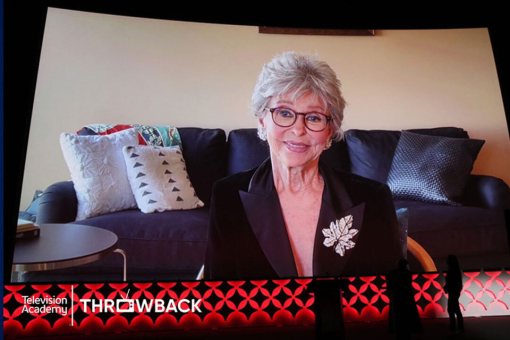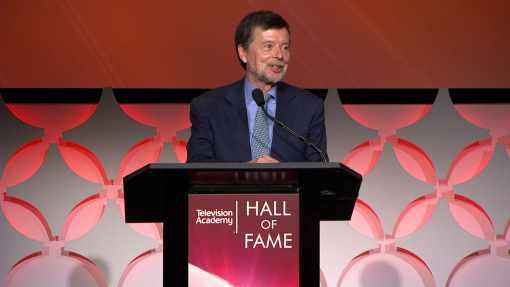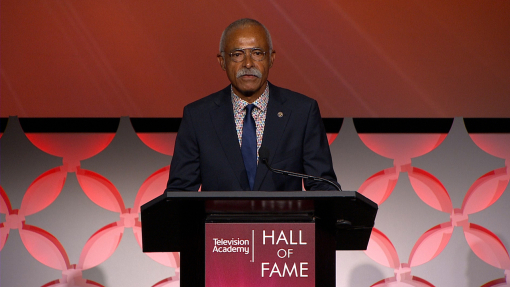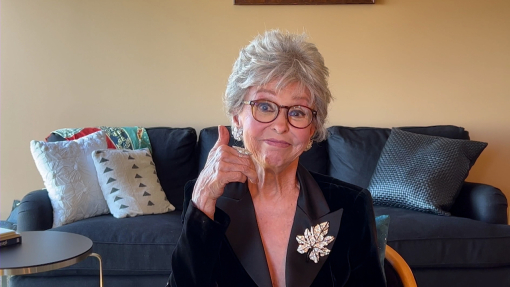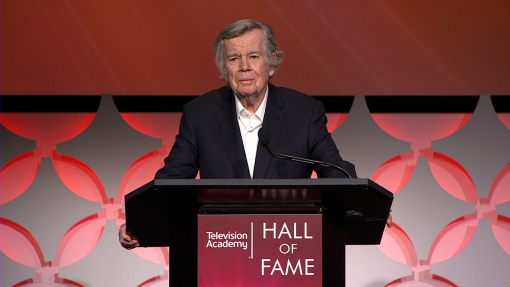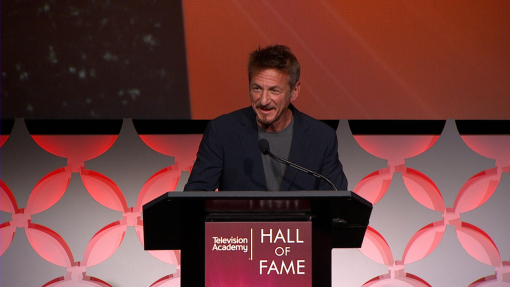Ideally, this article should begin with music — specifically, that inimitable, swinging theme music that contributed a note or two to the soundtrack of the 1960s. You know — bum buh-DA-duh-DA-duh-DA-dum … dah-DA-dum …
Then the article should walk right into a nice 1963-vintage living room, and do a pratfall over an ottoman.
Seeing that both ideas are impossible, it might as well begin with a very telling comment about its inimitable subject, Dick Van Dyke:
"Dick Van Dyke," said Carl Reiner, “is one of those extraordinary actors who never, never thinks about himself. When you say ‘Roll 'em!’ or ‘Action,’ some actors will give you 30 excuses to cut a scene. Dick will never cut a scene. He'll fumble his way through.”
A Van Dyke fumble, it should be pointed out, is another actor's finesse. Reiner — creator, writer, and co-star of the justly hallowed, still-in-syndication Dick Van Dyke Show (source of the above music and ottoman-pratfall reference) — supplied a rather crunchy illustration of this phenomenon:
“There is a scene in The Comic [a feature written and directed by Reiner in 1969] where Dick was a very old man eating soft-boiled eggs. You know, you crack the shell and eat it from an egg cup. Well, he's watching television — an old Jungle Jim movie — and reading a paper with a magnifying glass. He's a very old former star living in one-room apartment in Hollywood, near the old studios. The scene is beautiful — a long shot.”
Right. It's a touching moment. Van Dyke plays an elderly and somewhat forgotten silent movie era comic (a role he based partly on the great Stan Laurel, whom he had befriended).
"His face is reflecting the fact that he's old and lonely," Reiner continued. “Loneliness was the theme. At the end of the scene I said, ‘Cut,’ and Dick suddenly spits everything out and says, ‘Goddamn it!’ He says, ‘I was eating half an egg shell!’ In other words, he was eating the eggs as if he was enjoying them, as if they were perfect, and all the time he had a mouthful of shell! I said, ‘Dick, there isn't another actor in the world who would not have told the director to stop because of a mouthful of egg shells.’ Well, that's the kind of non-wavemaker he is. He wouldn't ruin anyone else's scene — but this was his scene! He still wouldn't ruin it — for the lighting men, the director … We used the take.”
That type of trouper discipline is more readily found in a stage-raised entertainer like, well, Laurel — not a denizen of the land of the retake and pick-up. But that's Van Dyke, non-wave-maker — also variously described by friends and colleagues with the following Hollywood-shy adjectives: unselfish, subtle, gentlemanly, kind, professional … "Nice guy finishes first," as one put it.
That essential Van Dyke nature always informs his many characters, whether it's Rob Petrie, Bert the Chimney Sweep in Mary Poppins, or the broken, over-the-hill actor in the 1982 HBO movie, The Country Girl. To chat with the dapper, silver-haired septuagenarian (is it possible?) is to understand what he means when he says of his most recent role, Dr. Mark Sloan, on CBS' Diagnosis Murder:
"I think it's still pretty much the same character they're watching, actually. Rob Petrie grown old, that's all." (He does begin a conversation by saying "it's a puh-puh-leasure," bringing to mind nothing if not Petrie accepting a dinner invitation from Alan Brady.)
That's not quite all (although Dr. Sloan does have a tendency to tap dance and sing in the hospital corridors). Like Jimmy Stewart, perhaps, or Bogart, or Cary Grant, Van Dyke is one of those greatly gifted actors who, in the process of bringing to life wildly diverse characters, somehow still remain … himself. As his dear friend and one time agent, Saul Leon (who first helped steer Reiner & Co. in Van Dyke's direction) said: "Nobody, I think, has ever tried to imitate Dick Van Dyke. He takes his place among the very top comedians for his own unique ability." Ideally, the article should, at this juncture, dive into a sidewalk chalk painting and dance with Julie Andrews and a few penguins. In lieu of that, it will relate some background:
Dick Van Dyke was born December 13, 1925, in West Plains, Missouri, to Hazel and Loren Van Dyke. His dad was one of the lucky Americans to be employed during the Great Depression, spending much of his time on the road selling products of the Sunshine Biscuit Company. As a result, Dick and kid brother Jerry were somewhat left to their own devices, growing up in the green, leafy town of Danville, Illinois, in the late '20s and '30s. It is possible, in fact, that Van Dyke became an entertainer partly out of a need to find ways to entertain himself. He went from Depression to comedy, you might say, with a little help from magic:
"When I was a little kid, magic was my big thing," he fondly remembered one recent afternoon from his woodsy Malibu, California, home. “I saw a magician at a show, and it got me interested. I started fooling around with magic tricks at home. There was a little local magicians' club, mostly businessmen, and when I was 13, they let me in. I performed around the various Kiwanis clubs and those types of things until I was about 15. They were mostly stock tricks — certainly nothing original.”
Perhaps not, but his rather original stage presence began to take hold. In high school, he gravitated to drama, the band, ("I played trombone," he laughs, incredulously — "I wouldn't even know what to do with the thing today"), glee club, anything involving standing on a stage. No mystery here — he simply "liked everything about performing," and performing liked him in return. Even in the Air Force as an 18-year-old enlisted man, Van Dyke wound up hosting a radio show. A return to civilian life left him in a position to try the only kind of profession he really failed at (lack of enthusiasm, not acumen): a nine-to-five job in the advertising racket. He'd been at it about a year before one Phil Erickson came to town with a three-man act called The Make Believes, a record-pantomime trio (they were popular in those days). Van Dyke's 22-year-old voice, now broadcasting over a local radio station, caught Erickson's attention. The Make Believes, it seemed, had broken up.
"Phil asked if I had any interest in going out and barnstorming with an act," said Van Dyke. "It was just what the doctor ordered for me, because I didn't know what to do with myself. So I came to Los Angeles with him in 1947, and we knocked around town for a long time."
The act was called The Merry Mutes, and they pantomimed to records, satirizing popular singers of the day, and opera — a la Spike Jones and his City Slickers ("We were like Milli Vanilli," cracked Van Dyke, "only we were funny.") How successful were they? Enough to "kick around" for five years, including a stint in Las Vegas. In 1953, it was on to Atlanta, Georgia, where Van Dyke hoped to find a less nomadic life in which to raise his two small sons, Christian and Barry (his co-star on Diagnosis: Murder). He hosted a couple of local TV shows, landed a variety show in New Orleans. One day an old Air Force buddy named Byron Paul dropped by — a buddy, as it happened, who had become a CBS Television director in New York. Dick directly followed Paul to the Big Apple, and promptly found himself hosting The CBS Morning Show.
From there it was a hop, skip, and a soft-shoe (almost literally) to Broadway — with in-between stops at The Ed Sullivan, Garry Moore, Dinah Shore, and Perry Como Shows. Things weren't that simple, of course. Dick described the scene in ironic tones that are as close as he gets to complaining. “I had to do a lot of game shows at CBS that I wasn't that crazy about. I did one called Mother's Day that came from a nightclub in Manhattan, and my God, I hated it so bad. We had diaper-changing contests — not my cup of tea. So every day, as soon as the show was over, I'd go out and audition at theaters. I didn't care what it was — musicals, Shakespeare … And I finally landed a part in Bye Bye Birdie, thanks to Gower Champion. Just from going around and doggin' 'em. I got that part and got a Tony for it. So it was worth all the effort.”
It was during Birdie (he learned to dance just for that role) that Reiner dropped in to watch. The rest is American entertainment history.
"Carl Reiner's writing was the main reason The Dick Van Dyke Show worked so well," Van Dyke said in a 1993 interview. "There was nobody like him. He was such a student of human nature. He wrote to our strengths. He picked up our speech patterns, our behavior patterns, and had us all playing ourselves."
That last line is true in the extreme. Perhaps no program in television history seemed more natural than The Dick Van Dyke Show, which ran from 1961 to 1965 on CBS. The idea that Rob and Laura Petrie (a very young Mary Tyler Moore) were really a couple of actors who weren't married was genuinely hard to believe. The comedy wasn't awkwardly concocted, it was laughably plausible, realistically wacky (and sometimes surprisingly poignant). Reiner, of course, was integral to making this happen in more ways than one. As is now well known, Van Dyke replaced him in the lead role when the pilot for the series wouldn't sell (Reiner opted for the indelible part of Alan Brady instead).
After five years on top of the ratings, Reiner decided to go out a winner, and pulled the plug on the show. Those five years might have been the most densely packed of Van Dyke's career. Daughters Stacy and Carrie had arrived by then, along with a couple of more rather imposing jobs: the screen version of Birdie, and the other role he is best known for — the endearing Bert in Disney's Mary Poppins. "That was one of the great experiences of my life," he said.
“Walt Disney called me to come in and talk about it. I was amazed, because there was a Cockney accent, but he just felt that I could sing and dance the part. The Sherman Brothers played the score for me, and then Walt had room after room after room of storyboards, all in full color, and I walked out of there saying this is going to be one of the best kids' movies of all time. I was so tickled to be a part of it. I asked him if I could play the old banker, too, and sing that song. I had to do a screen test and make myself up, and he bought it. I didn't make him pay me anymore — I just wanted to do it.”
(Of the fact that Disney still owns the rights to a Poppins sequel, Van Dyke remarked, "The only thing I could play now would be the old banker — and without the make-up.")
Some of the headlines of the rest of the Dick Van Dyke acting story would probably include: The New Dick Van Dyke Show in the mid-'60s; his Emmy-nominated (he's won five, including three for The Dick Van Dyke Show) 1974 dramatic milestone, The Morning After, a tour-de-force study of an alcoholic; a slew of dramatic TV guest roles (including Columbo), the feature The Runner Stumbles, 13 Dick Van Dyke Variety Specials for NBC (a fourth Emmy comes from those); a 1979 Broadway revival of The Music Man; a 1982 CBS Library Special, Wrong Way Kid (his fifth Emmy); guest spots on Matlock, Highway to Heaven, and Jake and the Fat Man; and Dr. Mark Sloan in Diagnosis: Murder.
There are also more private headlines, of which Van Dyke is equally proud: certainly his family, his friendship with Laurel, and his time with that most daring of all physical comics, Buster Keaton. Van Dyke, famous for having remarked that he wishes he had been born in the silent era, sought out the remaining half of Laurel and Hardy during Laurel's waning years, when "the skinny one" was living fairly anonymously in a Santa Monica seaside apartment.
"Stan called him Dickie," said Bob Palmer, Van Dyke's longtime friend and publicist. "Stan was very fond of him, really admired Dick's work. He was so thrilled to have this young incredibly successful talent paying attention to him, so it was a real compliment. It was mutual."
There's also a wonderful story about Van Dyke's first meeting with Keaton, at the man's unassuming house in North Hollywood, California. Both were somewhat shy. Van Dyke, who had been invited over, sat in the kitchen chatting with Eleanor Keaton for quite some time, with no sign of her husband. In time, Van Dyke realized that Keaton was outside, sort of lurking around the house, peeking in through various windows — rather as he had as a spy in his classic, The General. Eventually, The Great Stone Face came in, and the two became friends. Van Dyke eulogized both Laurel and Keaton at their funerals in the mid-'60s.
There's another important aspect of Van Dyke's life that must be mentioned — his toys. The guy spends hundreds of hours in a guest house over a garage on his property, creating special effects with computers. (The hobby, says Palmer, is behavior learned during his childhood when he was left to amuse himself.) He has, among other projects, created a version of Jurassic Park with some of his grandkids inserted among the leviathans, and once injected his present-day self into the old Dick Van Dyke series, sneaking around behind the young Dick Van Dyke, giving pointers. The latter might make a diverting promo for Nickelodeon's Nick at Night, which airs the show — and now boasts Van Dyke as its on-air "Chairman."
"Yeah, they call me that," laughed Van Dyke. “We hit it off so well, they said, ‘Why don't you come over and represent us on the air?’ This tickled me, because I like their programming. It's run by really quite a young group of people, very responsible, and they care about what they're showing to kids.”
Van Dyke is blunt in his concern for children, and the future of the tube — fearing that the bulk of programming is "going the same way as the rest of the culture:"
"There doesn't seem to be any responsibility on the part of the producers," he said. “I disagree when they say that we are simply reflecting the culture, and we're certainly not having any effect on it. I think it's the very opposite. I think they are literally forming the culture, especially for young people. There used to be a thing called the Hayes office or the Johnson office, a censor bureau, and one of the rules was, in any movie, the bad guys had to pay. That was a plot requirement. For some reason, that went by the boards. There shouldn't have to be a code to follow, they should take some responsibility for what they're teaching people.”
As for being inducted into the Television Hall of Fame, Van Dyke was — no surprise here — modest:
“I don't feel I ought to be up there on stage with guys like Bill Moyers, who is one of the few guys who really make television live up to its early promise. I'm a guy who's a product of mentors [he cited Erickson, Paul, Champion, Reiner, and Disney]. I've been very, very lucky to have been picked up by very, very talented people.”
Ideally, at this juncture, the article should work up a sketch with Buddy and Sally, or step around that 1963 ottoman, as Rob eventually did. Instead, it will close with a quote from Reiner:
“Dick always said, while we were doing The Comic, that he was born in the wrong era — should have been born in the silent days. Well, he doesn't know that he was really born in the right era. He almost single-handedly invented his kind of situation comedy acting — he took it up many notches.”
This tribute originally appeared in the Television Academy Hall of Fame program celebrating Dick Van Dyke's induction in 1995.

